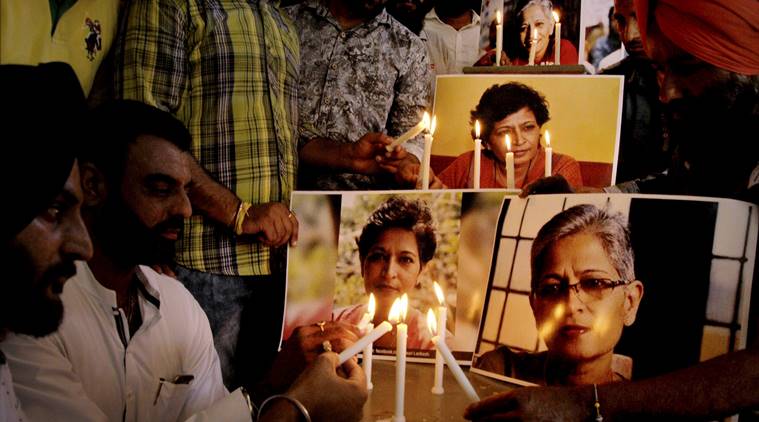
The devastating news of the assassination of senior journalist Gauri Lankesh on 5 September signals the broken road that lies ahead of us. It is no longer an individual targeting of firm and fearless voices of dissent – it is now the decimation of dissent itself, and the rise of fear as the only emotion that is guaranteed security of life and person in India today. The wave of Hindu fundamentalism marked by murder and mayhem has swept across this country, under the protectorate of governments holding citizens captive – in minds and in actions. We can already see the disastrous effects of self-censorship in our everyday personal and work lives and in institutional deliberations.
But is there a safe space any more? For after all, violent silencing of disagreement is driven and fuelled by shifting targets.
The deep, deep tragedy of Gauri Lankesh’s death is rendered totally banal with the trading of blame between the BJP and the Congress. The new rise of fundamentalist forces in India blurs narrow political boundaries through the violent convergence of ideology with impunity. The fact is that fundamentalist politics operates through the outsourcing of violence to anyone who is willing to kill anyone who disagrees, and all the rest shielding those that kill, overtly or covertly. The guarantee is that there may be no investigation – or theremay be an investigation that ensures impunity; there may be no trial, and there may be no conviction. Scrolling through the roll call of those that died for speaking their minds in fact shows us that this is the end of the road. There will be an individualizing of the ‘provocation,’ the ‘trigger’ and the murderous act. The question that will be asked by investigators is ‘what did she do to invite the messengers of death?’ – not ‘why are there messengers of death lying in wait in a state of readiness for the next target?’ The same story yet again, and we watch – angry, vocal, non-violent, but rendered totally powerless to make a difference.
The flip side of this is that conviction is guaranteed through ‘speedy trial’ for putting a name to the evil – through defamation laws as Gauri’s own conviction shows. A defining element in this menacing harassment is to divert and deplete the energies of the critic, even while plans are afoot to wipe her off the face of the earth.
While the acts in each case are outsourced, let us not forget that it is systematic, part of a larger plan, an open conspiracy to annihilate difference on so many different tracks all at once, measured out to make us lose count. What will it take for us to turn this reality around? What do we need to do to set a new balance in public discourse that is framed by democratic values and respect for divergent, even fiercely opposed worldviews? How do we defeat the narrow bigotry and sycophancy that has come to define politics, religion and everyday life in this country today?
Gauri’s assassination is an unprecedented assault on a free press. More direct than ever before. It is a warning of what lies in store for all those committed to free speech. There are mobs on the rampage, killing Muslims, Dalits, women, students, beef-eaters, supporters of beef-eaters, conscientious dissenters, human rights defenders, journalists, professors, political activists, rationalists, union organisers… We are now citizens of a country being forced into amnesia – the memory of who we are obliterated through the expunging of history not to speak of its distortion, the fracturing of dissent, and the propagation of banality in the name of religion and faith that sends reason to the gallows, and reduces us all to ‘bare life.’
At the precise moment when the Supreme Court of India affirms our right to ‘constitutional happiness’ (to use Upendra Baxi’s words), we plunge into an abyss of hopelessness. The fences are closing in on us, rapidly: demonetization to assassination is one short road to the end of freedoms for our people where we see both ends of the conspiracy against citizens in a constitutional democracy work in close concert. In an age of post-truth twitter governments that glitter, accountability is a dead word, as is the rule of law.
The assassination of Gauri Lankesh must push us to rise and resurrect our power of collective protest – using every method from every strand of resistance we have learnt about. It is time for us to rebuild that road that lies broken ahead of us, if we are to take even a single step into the future.




